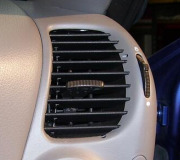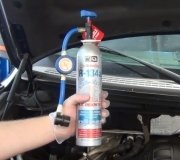Thanks, MOTLEYCRU for that followup, but there's more to the story. Unlike home refrigerators, automotive AC systems can handle some over-charge before liquid will slosh into the compressor and damage it. The problem when adding a partial charge from individual cans is there is no way to know how full of charge the system is. As far back as the 1960s, Chrysler used a sight glass in their receiver / driers. You could add refrigerant until the bubbles just disappeared, then the system was full and not over-charged. Ford started using sight glasses in the '80s, but the problem is even when the correct amount of refrigerant is in the system, you'll still see bubbles. You can keep on adding and adding until the compressor seizes, and there will still be bubbles in the sight glass, so it has no value. The only way to know if the correct charge is in the system is to recover what is in there now, pump the system into a vacuum for at least a half hour, then pump in the exact measured amount through a charging station.
Even before the compressor is damaged, the goal is to get just the right amount of refrigerant in the system so the liquid level is right in the middle of the evaporator in the dash. That point, where it changes from a liquid to a vapor, is where it turns real cold, and you want that to be inside the car, not under the hood.
The additional problem with Fords is they use quick-connect fittings on the hoses so they go together faster on the assembly line. Almost all of those leak, so it can be expected to need to recharge the system as often as every two years. It doesn't pay to replace those hoses because new ones are just as likely to leak.
Moisture is the deadly enemy when mixed with refrigerant. It will combine to form an acid that attacks metal parts, and will cause intermittent performance problems. When the system has a leak and the pressures go down far enough, a running compressor can pull the low side into a vacuum, and potentially draw in outside air, along with the humidity in it. That must be avoided, and to do so, all AC systems use some type of low-pressure cut-off switch. It stops the compressor from running when the pressure gets pumped too low. The classic symptom of low pressure due to low charge is the rapidly cycling compressor clutch, on and off, sometimes as often as once per second. The symptom described here in the initial post matches that.
Wednesday, April 26th, 2017 AT 2:46 PM




